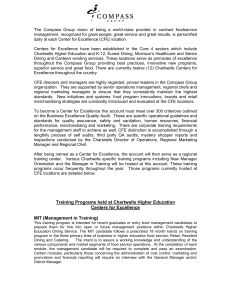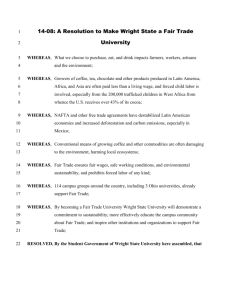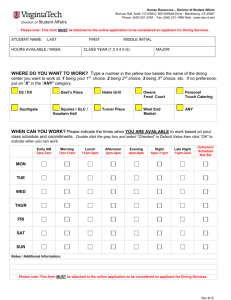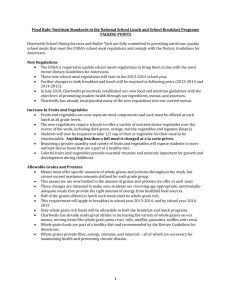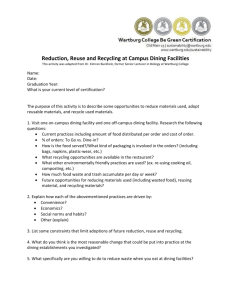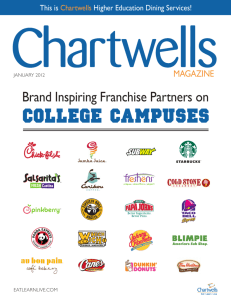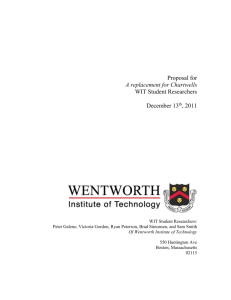Chartwells sustainablility document
advertisement
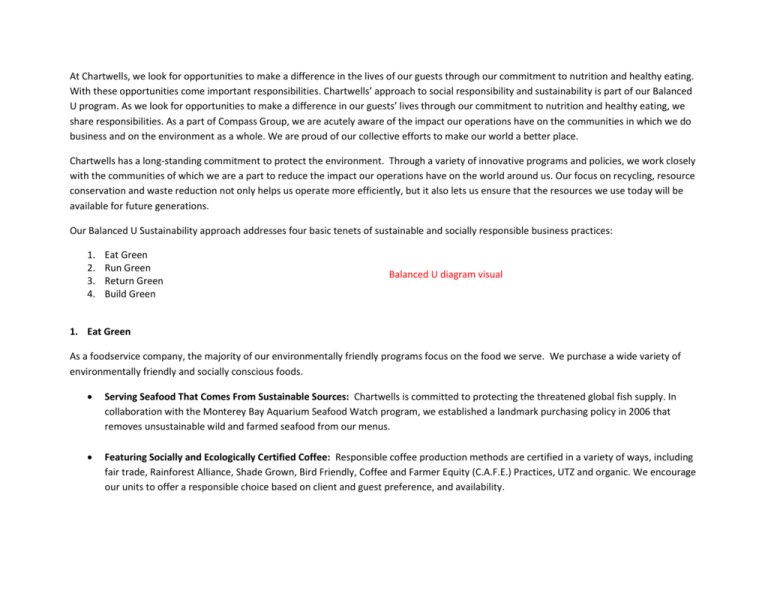
At Chartwells, we look for opportunities to make a difference in the lives of our guests through our commitment to nutrition and healthy eating. With these opportunities come important responsibilities. Chartwells’ approach to social responsibility and sustainability is part of our Balanced U program. As we look for opportunities to make a difference in our guests’ lives through our commitment to nutrition and healthy eating, we share responsibilities. As a part of Compass Group, we are acutely aware of the impact our operations have on the communities in which we do business and on the environment as a whole. We are proud of our collective efforts to make our world a better place. Chartwells has a long-standing commitment to protect the environment. Through a variety of innovative programs and policies, we work closely with the communities of which we are a part to reduce the impact our operations have on the world around us. Our focus on recycling, resource conservation and waste reduction not only helps us operate more efficiently, but it also lets us ensure that the resources we use today will be available for future generations. Our Balanced U Sustainability approach addresses four basic tenets of sustainable and socially responsible business practices: 1. 2. 3. 4. Eat Green Run Green Return Green Build Green Balanced U diagram visual 1. Eat Green As a foodservice company, the majority of our environmentally friendly programs focus on the food we serve. We purchase a wide variety of environmentally friendly and socially conscious foods. Serving Seafood That Comes From Sustainable Sources: Chartwells is committed to protecting the threatened global fish supply. In collaboration with the Monterey Bay Aquarium Seafood Watch program, we established a landmark purchasing policy in 2006 that removes unsustainable wild and farmed seafood from our menus. Featuring Socially and Ecologically Certified Coffee: Responsible coffee production methods are certified in a variety of ways, including fair trade, Rainforest Alliance, Shade Grown, Bird Friendly, Coffee and Farmer Equity (C.A.F.E.) Practices, UTZ and organic. We encourage our units to offer a responsible choice based on client and guest preference, and availability. Due to the wide range of economic, social and environmental concerns within the diverse coffee-growing regions, many certifications are available that address the needs of the coffee industry. Chartwells is committed to sustainable farming practices, and we have developed relationships with the top retail coffee brands in America. Each of our coffee partners has the ability to purchase from these sustainable resources. Compass Group currently purchases more than 2.5 million pounds of sustainable certified coffee per year. Providing Fresh Yogurt and Milk That Is Free of Artificial Growth Hormones: Chartwells serves only fresh fluid milk and fresh yogurt from cows that have been certified to be free of the artificial growth hormones rBGH/rBST. Recombinant Bovine Growth Hormone (also known as Recombinant Bovine Somatotropin) is a biochemical injected into cows to increase their udders’ size and milk production. rBGH is banned in most industrialized nations but has yet to be recognized by the FDA for its implication in causing cancer, abnormal growths/tumors and decreased effectiveness of antibiotics. Offering Certified Humane Cage-Free Eggs: Chartwells only offers Humane Farm Animal Care (HFAC) certified cage-free shell eggs nationwide. In December 2007, Chartwells implemented a cage-free shell egg policy. All units are required to only offer shell eggs that are certified by the HFAC program in partnership with the Humane Society of America. Purchasing Poultry Produced Without the Routine Use of Human Antibiotics: The non-therapeutic use of antibiotics in animal production is a growing public health concern because it decreases the effectiveness of antibiotics to treat diseases in humans. Therefore, we offer chicken and turkey that have been raised with restricted use of these drugs, especially as a growth additive in feed. Our contracted suppliers are required to provide products that adhere to criteria developed in partnership with The Environmental Defense Fund. Buying Local Products to Support Family Farms: Supporting the preservation of the American family farm, reducing the carbon footprint of our supply chain, and giving back to local communities are central to Chartwells’ core values. In collaboration with our partners at the Institute for Agriculture and Trade Policy, we are seeking to reduce our dependence on factory farming and to partner with qualified local and regional growers to encourage our units to develop relationships with local farms whenever possible. Compass’ corporate goal was to develop partnerships with 2,013 American family farms by 2013, and we surpassed that number in 2012 – partnering with 2,086 farms. In support of our companywide commitment to sustainability and wellness, Chartwells has been making strides to establish relationships with local farmers and produce distributors in order to encourage local buying and promote seasonally available produce. Chartwells defines “local” as typically within a 150-mile radius of the producing facility. A “local farmer” farms as an occupation, not a hobby. We train our managers and chefs to build relationships with local farmers and produce distributors. To ensure food safety and traceability of local produce, purchasing is done through an approved produce distributor. 2. Run Green Daily business practices for all Chartwells dining locations focus on energy and resource conservation. With the discussion on climate change continuing to grow as an important element of business policy, Chartwells is pleased to deliver solutions that will assist our clients to mitigate the carbon footprint of their dining service operation. Love Food Not Waste: This campaign has been developed to bring awareness and address client concerns about the waste that is created and its cost impact to the operation. The campaign is composed of four key areas of waste related to food service: Food Waste, Water, Energy and Packaging. Each area addresses ways that our staff and guests can impact the amount of waste they produce by encouraging them to change their behavior. Love Food Not Waste will not only bring attention to the environmental concerns, but also to the costs that can be saved by making a few simple changes. Project Clean Plate: The goal of Project Clean Plate is to encourage students to reduce food waste within the campus dining system. Each year on college campuses, students throw away hundreds of tons of food. This large volume of solid waste not only adds to the environmental impact of a community’s landfill, but more important, this waste of food reminds us that we must do more to help solve global hunger. Through goal-setting and charitable contributions, Project Clean Plate helps raise social awareness of these problems among your students. The way the program works is simple. First, a dining hall sets a goal to decrease food waste. Then, the waste on students’ plates at the end of the meal is collected and weighed, and when the reduction goal is attained, the dining hall makes a donation to a local hunger charity. To motivate the students to only take what they will eat, Chartwells awards prizes to everyone who cleans their plate. Trayless Dining: In 2008-09, Chartwells’ resident dining operations instituted a trayless dining program to reduce waste and conserve energy. From October 2008 to April 2009, 26 Chartwells accounts measured the effect of trayless dining (i.e., elimination of cafeteria trays three days per week in resident dining all-you-care-to-eat environments) on: • Water reduction (gallons used to include washing trays, compared to gallons used to wash dishes and silverware only) • Chemical savings in dollars (amount of detergent used to include washing trays, compared to the amount of detergent used to wash dishes and silverware only) • Food waste savings (solid and liquid combined) compared before and after the trayless test period (measurements taken on trayless and non-trayless days by volunteers scraping food and liquid waste into containers and comparing measurements in pounds) Savings: Water reduction of 255,000 gallons; chemical savings of $18,000; and food-waste savings of 43,000 pounds. Use of Concentrated Cleaning Products: We utilize concentrated cleaning agents that allow us to reuse containers and reduces the amount of corrugated packaging and plastic. Green Cleaning Products: One of the pillars of Chartwells’ corporate environmental policy is pollution prevention. To achieve this objective, we strive to seek substitutions to hazardous materials and products and take all reasonable steps to safeguard human health and the environment. We are proud to offer a line of Green Seal certified products available for cleaning. These products meet Green Seal’s environmental standard for industrial and institutional cleaners based on their reduced human and aquatic toxicity. Reusable Products Program – Chartwells offers a “Bring Your Own” mug/cup program and many of our campuses offer plastic re-usable to-go containers. Reusable dishware programs reduce our carbon footprint by reducing waste, plastic and Styrofoam production, transportation and packaging. Food Donations: Chartwells has a great relationship with Food Recovery Network, which is a student-operated nonprofit working on college campuses to curb food waste and end hunger. They work with students to start “chapters” on college campuses that serve as food-donation-liaisons between nonprofits and college dining services. We currently have 13 chapters of Food Recovery Network, and it’s always growing! If there is not a FRN Chapter on your campus yet and you are interested in spearheading this student initiative, please contact our Dining Services team. Energy Conservation: The benefits of responsible energy conservation are multifold. Conserving energy not only preserves resources, but our efforts help cut energy costs. Idling equipment at operating temperature is the greatest waste of energy in cooking. For this reason, we designed a program that minimizes energy costs and improves production efficiency in the kitchen. o Preheating equipment: Often, more energy is used to preheat equipment than to actually cook the food. Instead of requiring the opening cooks to turn on the cooking equipment at the beginning of their day, Chartwells instructs kitchen personnel to turn on equipment only when (and if) necessary. o Reducing temperatures: Turning the cooking equipment off or setting the temperature controls lower uses less energy during slack periods. This practice applies to griddles, ranges and broilers, as well as ovens. In many cases, the equipment is electrically divided into sections with separate controls. Because of this, we can operate only the necessary equipment during slower times and have the other pieces set to a lower temperature or turned off. Because of the time required to bake and roast most foods, ovens are generally not used for cook-to-order production and should be off during off-periods of the day. Efficient use of energy requires that all cooking equipment be turned off anytime that doing so does not interfere with production. In addition, Chartwells is glad to participate in all of SFSU’s energy conservation initiatives, such as minimizing the cooling and heating of vacant offices and energy reduction programs during summers. o Maintenance of equipment: Equipment operates more efficiently when well maintained. If a switch, thermostat, contact or heating element fails on a piece of electric equipment, it will not function properly until it is repaired. To save energy, Chartwells maintains its equipment to ensure proper operation and finishing of foods. Cooking equipment performs better and more efficiently when kept clean. Spills and splatters are always cleaned as they occur. This prevents foods from burning onto the equipment, making it more difficult to clean later. Burned-on spills and food particles will affect equipment performance and can result in an inferior product. We keep the physical plant abreast of all maintenance issues and monitor repairs on all equipment. Offering Packaging from Plant-Based Renewable Resources: Packaging itself is not sustainable unless it is part of a sustainable waste stream management system. Therefore, we offer our clients a program of disposable packaging made entirely from renewable resources and support our clients in efforts to approach their waste-stream management strategy responsibly. Look for these options on your local campus. Implementing Waste-Reduction Practices to Minimize Environmental Impact: Organic matter, especially food scraps, is a major contributor to the formation of methane gas, a greenhouse gas in landfills that is 23 times more potent than carbon dioxide in trapping heat close to the Earth’s surface. Chartwells is working extensively to reduce food waste by implementing a proprietary waste-reduction program in our units. We have developed Trim Trax, a food waste-reduction program and green initiative that can noticeably cut operating costs, as well as reduce our carbon footprint in landfills. It is designed to be implemented and executed by staff to increase engagement and operational efficiency, as well as create awareness about the environmental impact of food waste. The program tracks and measures food waste costs at college cafeterias, focusing on the following categories: o Production waste (food thrown out prior to cooking/service, such as vegetable peels) o Overproduction (unusable food that has gone through production and must be disposed of) o Unused/out-of-date inventory (expired, spoiled or overcooked) o Local innovation (a product identified by the associates that could benefit from improvement) 3. Green Fleet: Chartwells recently introduced our Green Fleet program to campuses across the country. Launched at the 2013 AASHE Annual Conference in Nashville, TN, Green Fleet is a line of bikes that provide a sustainable transportation option to our management teams at larger campuses. Equipped with a basket, each Green Fleet bike makes it efficient and green for our management teams to travel quickly from one dining location to another on campus. Select campuses have implemented additional programs for the bike including food delivery, small catering set-up transportation and pedal powered smoothies using a blender attachment. Return Green We work closely with campus organizations to offer education about how to recycle properly. On select campuses, we participate in Recyclemania and work with the local communities, as well. o Take advantage of consulting services on composting programs and provide unique composting options on select campuses. o Use compost in campus gardens when composting services are available locally. o Corrugated Cardboard: We break down boxes that do not have waxed sides and tie them into the proper-sized bundles for recycling. o 4. Oil and Grease: Oil is filtered as much as possible and then deposited into a grease trap, a special container supplied by a rendering company. The company then uses the oil for other products, such as animal feed or biofuel. Build Green Compass Design & Build provides Chartwells with exclusive design and build resources to create the most environmentally friendly dining locations available. Novus Group sources and negotiates pricing on Energy Star-certified foodservice equipment and building materials, recycled materials including countertops and soft furnishings, and sustainable flooring options. Compass Group is the go-to team for information on Green Restaurant certification and LEED building certification. Our Track Record of Success –Recent Accomplishments Compass Group USA purchases included: o o o o o o o o $29 million in local products (8 percent of total category) to support an estimated 2,086 American family farms – a 12 percent increase from 2011. $2.3 million in 2013 spent on local produce within Chartwells Higher Education, which was almost 8.5% of our total produce spend. Chartwells’ year to date spend in 2014 on local produce is $1.3 million, accounting for 5.4% of total produce purchases. 24.7 million gallons of fluid milk and 12.2 million cases of fresh yogurt – both free of artificial growth hormones (94 percent of total category). 56.5 million pounds of chicken produced without the routine use of human antibiotics (76 percent of total category). 28 million pounds of turkey produced without the routine use of human antibiotics (84 percent of total category). 64.3 million certified humane cage-free (shell) eggs from 247,000 chickens (19 percent of total category). 7.9 million pounds of sustainable seafood (72 percent of total category). 2.5 million pounds of Eco/Fair Trade-certified coffee (30 percent of total category). Our local produce efforts are unmatched. Compass Group purchased $29 million in local products last year, an amount unsurpassed by any foodservice organization.
